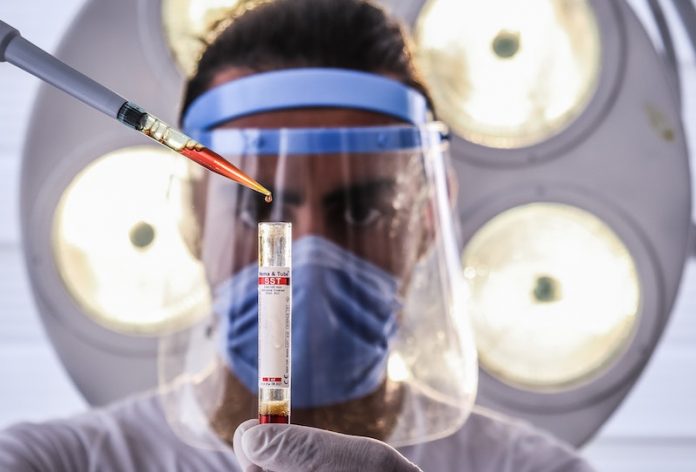
In a new study from the University of Alabama at Birmingham, researchers discovered a monoclonal antibody that potentially acts as a potent universal coronavirus therapy against the COVID-19 virus and all its variants of concern, including delta and omicron.
It also shows effectiveness against the deadly coronaviruses SARS, the Severe Acute Respiratory Syndrome that emerged in China in 2002, and MERS, the Middle East Respiratory Syndrome that appeared in Saudi Arabia in 2012.
It even shows effectiveness against several common cold coronaviruses.
The study is published on BioRxiv and was conducted by James J. Kobie et al.
This universal activity results from the monoclonal antibody targeting a region of the viral spike protein that is highly conserved among beta-coronaviruses, yet is also essential for the virus to attach and enter cells, leading to infection.
In the study, the team found the monoclonal antibody protected against infections when given as an intraperitoneal injection or a nasal dose.
The monoclonal antibody, and another monoclonal antibody discovered earlier by the researchers, are being developed as a therapeutic cocktail for COVID-19 under license to Aridis Pharmaceuticals, a California biopharmaceutical company.
The overall goal of researchers is to find antibodies that do not permit immune escape by mutated variants of SARS-CoV-2, the virus that causes COVID-19.
This includes Omicron and any future variants of concern. It is hoped that identifying and studying such antibodies can lead to the development of vaccines that protect from all coronaviruses.
One key in the present research was finding an antibody target on a part of the spike called the S2 or the stalk region. This region is highly conserved and only rarely mutates because that would disrupt its essential function.
Recent studies have found that some antibody treatments could help fight COVID-19 effectively.
One study showed that an antibody treatment could offer up to 18 months’ protection against severe disease.
Last year, AstraZeneca released results from a phase 3 clinical trial – the final stage of testing before a drug is authorised – that suggest its new COVID treatment, AZD7442, is effective at reducing severe disease or death in non-hospitalised COVID patients.
The treatment contains antibodies, which are usually produced naturally in response to a COVID infection or vaccination.
They work by recognising specific parts of SARS-CoV-2 – the virus that causes COVID – and either attack these directly or bind to them to stop the virus from working and flag it for destruction by other parts of the immune system.
After they’ve done their job of clearing the virus, the antibodies remain in the body for a period of time, making up part of our immunological memory. If what they target is encountered again, they can leap into action.
The new treatment, AZD7442, uses special antibodies called monoclonal antibodies. These are antibodies produced in a lab that imitate the body’s natural defences – in this case mimicking the immune system’s response to COVID.
Artificially developing antibodies to fight disease isn’t a new technique. This technology is already used to treat many diseases, including leukaemia, breast cancer and lupus.
In fact, this isn’t even the first time the technique has been used for COVID. The first COVID monoclonal antibody treatment was approved in the UK in August 2021.
AZD7442 is a cocktail of two monoclonal antibodies – tixagevimab and cilgavimab – that are designed to reduce the severity of a SARS-CoV-2 infection and so prevent people from getting severely ill.
Both of these antibodies bind to different parts of virus’s spike proteins, which cover its outer surface and are what the virus uses to infect cells.
It’s thought that attaching to these proteins is what gives the medicine its effect, as this stops the virus from being able to get inside cells and reproduce.
The two monoclonal antibodies in the cocktail are based on antibodies taken from patients who survived COVID.
Scientists at AstraZeneca took blood samples from patients and isolated immune cells called B cells, which are the antibody factories of the human body.
They then grew more of these B cells in the lab, and used them to make large quantities of the two antibodies, which they had identified as specifically targeting the coronavirus’s spike protein.
But the key difference between this and other antibody-based treatments is that in AZD7442, the antibodies have been modified so they stay in the body for longer.
AstraZeneca’s phase 3 trial examined the effectiveness of the treatment when given to patients who were infected with SARS-CoV-2.
The study looked at 822 participants who were over the age of 18. Only around 13% were 65 years and over, but 90% had health conditions that put them at high risk of severe COVID, such as cancer, diabetes, obesity, chronic lung disease or asthma, cardiovascular disease or a weakened immune system.
The trial results show that of the 407 people who received AZD7442, 18 developed severe COVID or died, compared with 37 of the 415 people who received a placebo.
This suggests that those in the AZD7442 group were 50% less likely to develop severe COVID than those taking a placebo.
If you care about COVID, please read studies about drug duo that may cure COVID-19 together, and this plant extract may help treat COVID-19.
For more information about COVID, please see recent studies about the cause of blood clots in people with severe COVID-19, and results showing coffee and veggies may help prevent COVID-19.
Copyright © 2022 Knowridge Science Report. All rights reserved.



